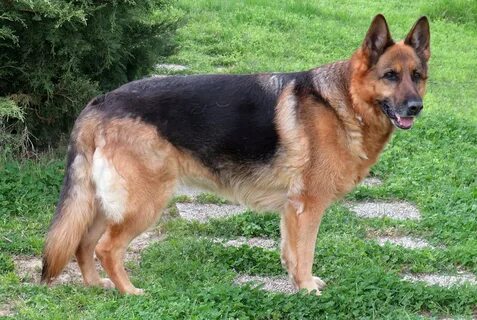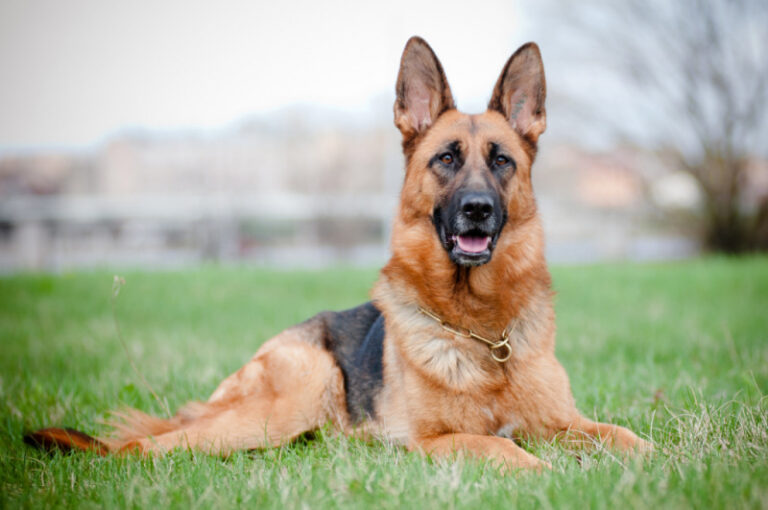German Shepherds remain one of the most beloved and recognized breeds worldwide, not just for their intelligence and working abilities, but for the deep emotional bonds they form with their families. This remarkable dog has been everything from a humble farmhand herding sheep in the German countryside to a heroic figure saving lives in times of war.
Let’s walk you through the fascinating world of the German Shepherd, exploring its origins, personality, care needs, and why it may—or may not—be the right fit for you.
German Shepherd’s Personality
Loyalty: If there is one word that sums up the German Shepherd, it is loyalty. These dogs develop a deep bond with their families, often becoming shadow-like companions who want to be wherever you are. They thrive when included in family life, and most times struggle if left isolated for a long period.
Intelligence: This is another cornerstone of their personality. German Shepherds are considered one of the smartest breeds in the world, capable of learning complex commands and tasks quickly. This intelligence, however, can be a double-edged sword. Without enough stimulation, they can become bored, and boredom in a German Shepherd usually results in destructive behavior. Imagine coming home to chewed furniture, shredded shoes, or a backyard full of craters—they’re not being “bad,” they’re just telling you they need more to do.
Despite their serious appearance, German Shepherds have a softer side. Many owners describe them as gentle with children, affectionate with family members, and surprisingly goofy when relaxed. They are protective, yes, but not naturally aggressive. A well-socialized German Shepherd knows the difference between a threat and a friend.
Appearance

A German Shepherd has an average height between 22 and 26 inches and weighs anywhere from 50 to 90 pounds. They’re influential without being bulky. Their long, bushy tail and pointed ears make them instantly recognizable. A German Shepherd is not a dog you overlook. Their bodies are powerful yet agile, giving them an almost royal atmosphere.
One of the most striking things about the breed is its coat. German Shepherds have a double coat designed to protect them in various climates. The outer coat is dense and slightly rough, while the undercoat is soft and insulating. The classic color is black and tan, but you’ll also find German Shepherds in sable, solid black, and bi-color patterns.
German Shepherds are known for leaving tufts of fur around the house, especially during seasonal changes when they “blow” their undercoat. Owners often joke that living with a German Shepherd means you’ll never wear black clothes without a lint roller. Regular brushing is a must to keep their coat healthy and your home manageable.
Exercise
The German Shepherd is built for action and requires at least one to two hours of exercise daily. Owning a German Shepherd is like signing up for a personal trainer you didn’t know you needed. A quick walk around the block is usually not enough exercise. They crave activities that challenge both their body and their mind.
Exercises such as long hikes, games of fetch in open fields, or agility training courses are to be considered. German Shepherds love jobs—something as simple as carrying a backpack on a walk can satisfy their need to feel useful. They’re also excellent running partners, provided you wait until they’re fully grown to avoid joint damage.
The key is consistency. A bored German Shepherd is an unhappy German Shepherd, and unhappy often means restless, noisy, and mischievous. If you’re an active person or you have a family, you’ll find their energy infectious and rewarding.
German Shepherd Dog Breed Training
Training a German Shepherd dog is a joy because they genuinely want to learn. Their eagerness to please, combined with their sharp intelligence, makes them one of the easiest breeds to train—when done correctly.
German Shepherds respond best to rewards like treats, praise, or play. Harsh training methods not only fail with this breed but can also damage the trust they naturally build with their owners. Positive reinforcement is the golden rule.
Early socialization is critical. From their puppy stage, they should be introduced to different people, environments, and other animals. This helps them prevent fearfulness or overprotectiveness as adults.
German Shepherds don’t just learn basic obedience—they excel in advanced tasks. Many participate in competitive obedience, protection sports, and even search-and-rescue missions. Their ability to switch from a disciplined working mode to a loving family dog is nothing short of remarkable.
For more tips on training, you might find the ASPCA’s dog care guide useful.
German Shepherd Dog Breed Grooming and Care
The German Shepherd dog breed needs a routine of grooming activities, which includes;
Regular Brushing: Their thick coats require brushing several times a week, and during shedding season, daily brushing is almost unavoidable.
Bathing: This should be done sparingly, only when necessary, to avoid stripping the natural oils from their coat.
RoutineCheck: Their ears should be checked weekly for signs of infection or buildup, and their nails should be trimmed regularly.
Dental Care: Dental hygiene is another important area not to overlook; brushing their teeth a few times a week can prevent long-term health issues.
Yes, grooming a German Shepherd is a commitment, but it also creates bonding moments between you and your dog. Many Shepherds enjoy the process, especially if introduced to it early.
German Shepherd Dog Breed Health
German Shepherd dog breeds are prone to certain health issues, particularly as they age. Hip and elbow dysplasia are among the most common concerns. These are inherited and environmental conditions that affect the dog’s joints and can lead to arthritis or mobility problems.
Another condition that owners should be aware of is degenerative myelopathy, a progressive spinal disease that can eventually cause paralysis.
Bloat, or gastric dilatation-volvulus, is also a risk—a sudden and life-threatening condition where the stomach twists.
Allergies, skin issues, and ear infections can also appear from time to time. Responsible breeding and regular veterinary checkups go a long way in preventing or managing these health challenges.
If you’re considering adopting, look into organizations like the German Shepherd Rescue and Adoption, which often provide health screenings and background information on the dogs.
Diet and Nutrition
German Shepherd Puppies should be fed a large-breed puppy formula designed to support healthy growth without overloading developing joints. Adults do well on high-quality foods formulated for large, active breeds.
Meals should be divided into two or three servings throughout the day rather than free-feeding, which can lead to overeating and increase the risk of bloat. Treats can be given, but they should be balanced with the dog’s daily caloric intake to prevent weight gain.
Fresh water should always be available, and consulting your veterinarian about specific dietary needs is wise, especially if your dog has allergies or sensitivities. For further guidance, explore PetMD’s nutrition resources.
Is the German Shepherd the Right Dog for You?
The German Shepherd dog breed is remarkable, but it may not be suitable for everyone. They demand time, energy, and commitment. They’re best suited for families or individuals who lead active lifestyles and are willing to invest in consistent training and socialization.
First-time dog owners may find the breed overwhelming, not because the dogs are inherently difficult, but because they require more experience than the average dog.
German Shepherds are happiest when they are included in daily life—whether it is accompanying you on a morning run, guarding the house, or curling up nearby in the evening.
If you want a dog that will not only love you but also protect and challenge you, then the German Shepherd may be your perfect match.
Conclusion
Owning a German Shepherd dog breed is not without challenges, but those who take on the responsibility are rewarded with a dog that is deeply devoted and endlessly impressive. For those willing to put in the effort, the bond with a German Shepherd is like no other.
Frequently Asked Questions
Are German Shepherds aggressive?
No, they are not naturally aggressive. With proper training and socialization, they are loyal, protective, and gentle family members.
How much exercise does a German Shepherd need?
They need at least one to two hours of physical activity every day, along with mental challenges such as training, puzzle toys, or simple tasks.
Do German Shepherds shed a lot?
Yes, they shed year-round, with heavier shedding during spring and fall. Regular brushing helps manage it.
What is the average lifespan of a German Shepherd?
The typical lifespan is seven to ten years, though some live longer with excellent care.
Are German Shepherds good with kids?
Yes, when socialized properly, they are affectionate and protective, making them wonderful family dogs.
